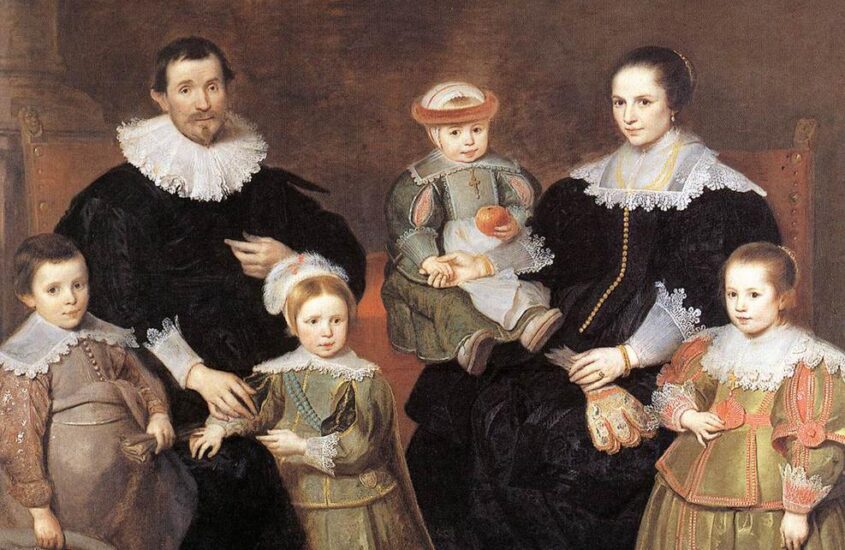“Birthing Person” And Other Modern Language that Degrades Marriage and Motherhood
Ani Slattery | Photo by Cornelis De Vos ,"The Family of the Artist"
Photo by Cornelis De Vos ,"The Family of the Artist"In my previous article I discussed how some of the modern language demoralizes and dehumanizes our children. I would now like to discuss some of the language surrounding marriage and child-rearing that has become popular in recent years.
Courtship vs. Dating
It is important to start with this one because it reflects the way society prepares people for marriage. Courtship traditionally is done solely for the purpose of determining whether marriage with this particular person would be right. It is more practical, and prayerful, and not about romantic feelings or physical connection (both of which prevent a person, especially a young woman and man, from making a clear-headed decision). It asks all the important and difficult questions up front: for example, regarding family, children, religion, the role of the man and woman, etc.
Courtship often involves family. Families introduce their sons and daughters to each other, and families are involved during the courtship process. Of course the details can vary, like in the case of my husband and I, coming from very broken families who do not view or value marriage the same way we do, so they were not very involved in our courtship. But the bottom line is that courtship is a very intentional way to determine whether this is the right person to marry.
Dating, on the other hand, does not have this same intent. It starts with seeking pleasure with another person, whether it be their company, their appearance, shared entertainment, or anything else. I will not discuss the degenerate side of dating, or “hookup culture”, but instead from the best possible angle. I will look at this from the perspective of a young woman, wanting to get married, who is trying to navigate the dating world. It comes with a lot of confusion, frustration and lack of clarity, because it does not focus on what is important. There is no clear end goal. In fact, it is not uncommon for a couple to “date” for years without ever talking about marriage or children. It often leads to women compromising their values, living with a man (and essentially playing marriage), wondering if/when he will ever propose. This has become an unfortunate norm in our society that results in young people not being prepared for or capable of properly entering into marriage.
Partner vs. Husband/Wife
The term “partner” has become popular as a very ambiguous way of referring to someone with which one has a relationship. It does not differentiate between people who are dating, living together, engaged, married; and it is used commonly by homosexuals. Using the same word for all of these instances degrades the sanctity of marriage. It says that marriage is just another choice alongside the other states mentioned. It denies that marriage is a sacrament under God, indissoluble, relating to the divine Bridegroom and His perfected Church, unrelated to pleasure, instituted by authority, transcendent of the power of the participants, set apart, and holy. . Additionally, it denies the roles within a marriage. To say husband and wife are “partners” denies the unique and important role a husband and wife each bring to a marriage. Because after all, men and women are not the same. Even if you choose not to use the term yourself, it is likely that you will see it on paperwork and forms involving your spouse, especially ones dealing with children and pregnancy (though I sometimes see the father left out completely!)
“Pregnant Person”, “Birthing Person”?
It is incredible how quickly I went from hearing these terms for the first time and thinking “this is so absurd, there is no way it will catch on”, to hearing professionals such as Obstetricians and Labor and Delivery nurses using these terms exclusively. I don’t think I need to elaborate on how degrading this terminology is to women, and, like I said in my previous article, I will not get into the political agenda behind this. Instead, I will focus on the language and ways we can counteract it. You probably will never use these particular terms, but I would like to draw your attention to an example that is much more common, as well as a way we can fight this degeneracy in language by being more specific in our own language.
“We are pregnant”
“We” referring to a husband and wife together. Obviously the wife is the only one pregnant, and I do not think most people using this expression mean to say that the husband is also pregnant, however that is objectively what it means and it would be best to use the proper language:. “My wife is pregnant”, “We are expecting a(nother) child”, and so on.
Now I would like to take it one step further –
Pregnant or With-Child?
Traditionally, “with-child” was the common term to use, at a time when everyone understood that it was a human child growing inside of the mother. This is something that is not common knowledge anymore unfortunately, and the language reflects this with the various terms used to describe a child in the womb (foetus, clump of cells, etc). According to Etymology Online, the term “pregnant” was not used in polite conversation until the 1950s. It is of course common today, and I am not arguing that there is anything wrong with using the word. However, we live in a time where there are forces working so hard and so fast to degrade marriage, motherhood, and children. They are using the language to do so. We can effectively counter these efforts by using very clear and truthful language, especially when dealing with these topics. It may feel silly to use a term like “with child”, but think about the absurdity in terms like “birthing person”, yet how strong the effort was to push the term and popularize it. So why shouldn’t we do the same?
The fact is that our society is driven by very active, personal forces, most of which hate children and motherhood. The tool which they use, which I have described, is the tool of language. There is no option to ignore it because they are aggressive, and they get into the home, even into our children’s bedrooms as they sleep (think about modern children’s books, or television and falling asleep to it; what sort of language does the best television program use?). Therefore, we should not only be defensive, but also offensive. By being proactive and shaping our language intentionally in the same way they do, we can not only undo what damage they do, but we can also improve our lives, improve our society, improve our children, and protect them by driving away people who are uncomfortable with common language which implies the beauty of a growing family.






